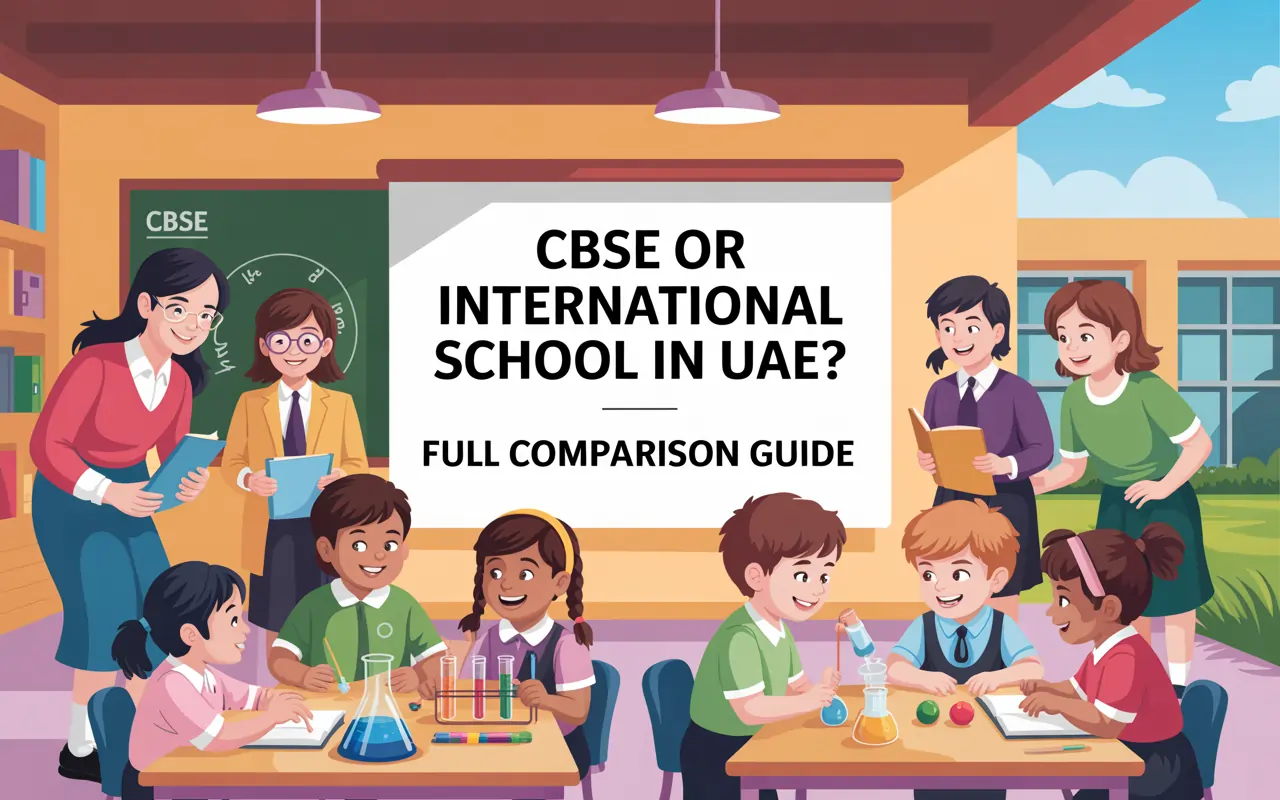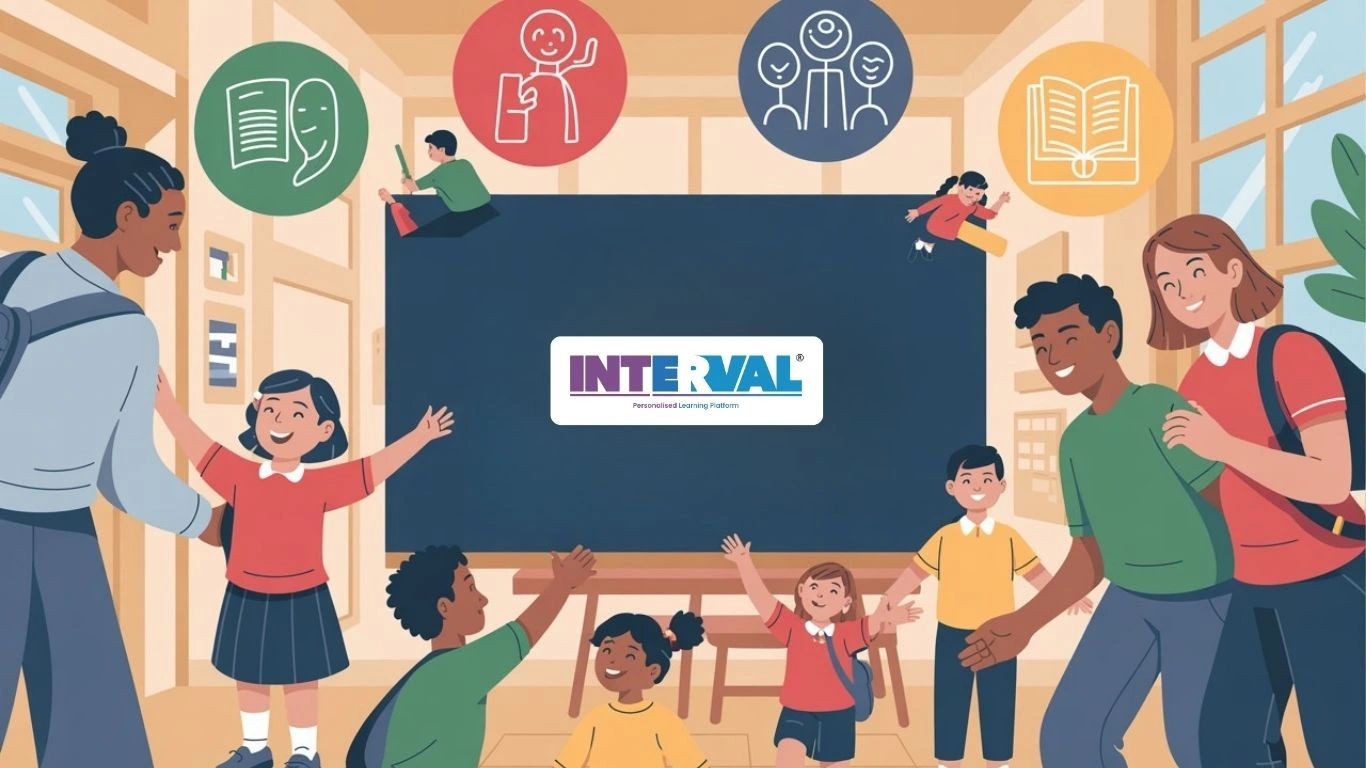CBSE or International School in UAE? Pros, Cons & What Parents Should Know




Choosing the right school for your child is one of the most important decisions you’ll make as a parent living in the UAE. With many options available, especially between CBSE schools and international schools like IB, British, or American curricula, it’s natural to feel overwhelmed. Each type of school comes with its own strengths, challenges, and long-term outcomes.
This blog helps you understand the key differences between CBSE and international schools in the UAE, along with what you need to know before making a decision for your child’s education.

CBSE stands for the Central Board of Secondary Education. It’s a popular Indian curriculum that many Indian schools in the UAE follow. The CBSE syllabus is consistent across schools and focuses on academic performance, especially in math, science, and English.
International schools, on the other hand, follow curricula like:
These schools cater to students from various countries and aim to prepare them for global universities and careers.
1. Structured & Recognized Curriculum
CBSE follows a centralized syllabus, which means that no matter where your child studies, the curriculum remains the same. This makes it easier for families who may shift between countries or cities.
2. Strong Academic Focus
CBSE schools often emphasize core subjects like maths, science, and English—excellent for students who want to prepare for Indian entrance exams like NEET or JEE.
3. Cost-Effective
Tuition fees in CBSE schools are generally lower than in international schools. This makes it a more affordable choice for many families, without compromising on quality.
4. Indian Teachers & Familiar Culture
Most CBSE schools hire Indian educators and celebrate Indian festivals, making children feel at home even while living abroad.
5. Board Exam Preparation
CBSE trains students for Grade 10 and 12 board exams, which are essential for Indian college admissions.
1. Exam-Centric Learning
The focus is mostly on exams and textbook learning. Creativity, hands-on projects, or inquiry-based learning may be limited.
2. Less Global Exposure
While CBSE schools do teach in English, they usually don’t focus much on global awareness, international perspectives, or cross-cultural learning.
3. Fewer Subject Choices
Students often choose fixed streams (Science, Commerce, Humanities) in Grade 11, and electives are limited compared to international schools.
4. Not Ideal for Studying Abroad
While CBSE is accepted in many countries, it may not provide the same smooth pathway to foreign universities as international curricula.
1. Global Recognition
Whether it’s IB, IGCSE/A-Levels, or the American system, international curricula are well-recognized by universities around the world.
2. Inquiry-Based Learning
Students are encouraged to think critically, work on group projects, explore real-life applications, and express creativity. Learning goes beyond textbooks.
3. Multicultural Environment
International schools typically have students and teachers from different countries, which helps children develop global citizenship skills and appreciate other cultures.
4. More Flexibility
These schools offer a wide range of subject choices. Students can mix and match subjects based on their interests, especially in IB and British systems.
5. Focus on Holistic Growth
Leadership, communication, arts, music, and sports are given equal importance along with academics.
1. High Fees
Tuition fees, uniforms, field trips, and extracurricular activities can be expensive. This makes international schools less accessible for some families.
2. Academic Pressure
While learning is student-friendly, programs like IB or A-Levels can be very demanding. Students need to manage time and be self-disciplined.
3. Different Standards
Not all international schools maintain the same quality. Some may have excellent teaching and facilities, while others may fall short.
4. Less Familiarity With Indian Culture
International schools focus more on global perspectives. This might mean fewer opportunities to celebrate Indian traditions and festivals.
Feature | CBSE Schools (UAE) | International Schools (UAE) |
| Curriculum Style | Structured, exam-based | Inquiry-based, global |
| Teaching Method | Teacher-led | Student-led, project-based |
| Subject Choices | Fixed (Science/Commerce/Arts) | Broad and flexible |
| Assessment | Board exams (10th, 12th) | Continuous, projects, coursework |
| Global Recognition | High in India | High worldwide |
| Class Size | Usually larger | Often smaller |
| Language Options | English + Indian languages | English + other global languages |
| Cost | More affordable | More expensive |
| Cultural Fit | Indian traditions, festivals | Multicultural and international outlook |
If your child learns best with structure and memorization, CBSE may be a good fit. But if your child enjoys open discussions, creativity, and projects, then international schools might suit them better.
Planning to return to India? CBSE is ideal.
Planning to apply to colleges in the US, UK, Europe, or Canada? International schools offer better preparation for those systems.
CBSE schools are more affordable. International schools can cost two or even three times more annually. Factor in tuition, uniforms, books, and activity fees.
CBSE schools offer Indian values and traditions, while international schools promote global awareness and diversity. Decide what matters more to your family.
Visit schools, talk to other parents, and read reviews. Look into the school’s inspection results from UAE’s education authorities like KHDA (Dubai) or ADEK (Abu Dhabi).
Choosing the right school board is one of the biggest decisions for parents in the UAE. With so many options, CBSE, IB, British, American, and more, it can be hard to know which one fits your child best. Each curriculum has its own teaching style, strengths, and goals.
If you're unsure which board is right for your child’s learning style, future studies, or your family’s plans, check out our detailed guide:
Which Curriculum Is Best in UAE? A Complete Guide to Choosing the Right Board for Your Child.
There’s no one-size-fits-all answer when it comes to choosing between CBSE and international schools in the UAE. What matters most is finding a school that aligns with your child’s personality, your family’s aspirations, and your educational values.
No matter which curriculum you choose, every child can benefit from extra attention and guidance, especially in competitive or international environments.
At Interval Learning, we provide:
Help your child thrive, no matter what curriculum they follow.
Talk to an expert or Book a demo class to explore Interval Learning programs today.
Contact us today!
There is no "better" curriculum; it depends on your child’s goals. CBSE is ideal for Indian university pathways; international schools are better for global education and university admissions abroad.
Yes, CBSE schools are generally more cost-effective compared to international schools, making them a good option for families seeking quality education at a reasonable price.
CBSE is accepted by many global universities, but students may need to meet additional criteria (like SAT, TOEFL, or foundation courses) when applying abroad.
Yes, but transitions can be challenging depending on the grade level. It’s easier in lower grades and harder in high school years due to curriculum differences.
Most international schools focus on holistic education and offer a wider range of extracurriculars like drama, music, sports, and community service.
Platforms like Interval Learning offer one-on-one online tuition for CBSE, IB, British, and American curricula, helping students stay ahead with personalized support.
Consider your child’s learning style, future education plans, budget, and personal comfort. Visit schools, talk to teachers, and consult experts at Interval Learning for personalized advice.